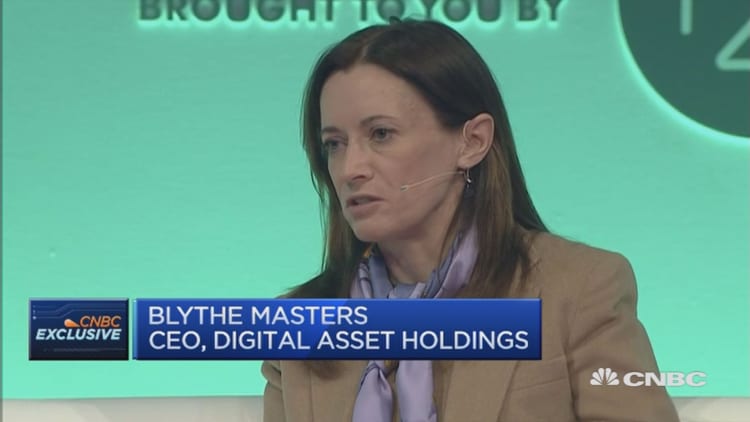


IBM announced Friday it is launching its framework for using the technology behind bitcoin, saying it's time for companies to come to terms with how the revolutionary technology will change their businesses.
As firms grapple with the buzz around blockchains — a highly secure and auditable form of information storage originally conceived for digital currencies — IBM is pushing out its certified and tested version to make that process easier for financial services, government and health care.
Although it sounds technical, that's big news for many industries that see the technology as potentially disruptive. And it's big news for other companies that are rushing to make "blockchain for business" a reality. (Microsoft has said it is working with banks on a similar goal.)
Jerry Cuomo, vice president of Blockchain Technologies at IBM, described client interest in the project as "immense," adding that he doesn't know of a financial services company that hasn't expressed interest in IBM's platform.
Read more about the promise of blockchains here.
That platform is a curated version of the Linux Foundation's open source Hyperledger Project, he said. IBM was a founding member of that project along with JPMorgan, Intel, Cisco, Wells Fargo, State Street and the London Stock Exchange Group.
So Friday's announcement is that IBM has chosen "the good builds," run a battery of tests, certified that the framework is secure, and is now widely distributing its version of the code to developers.
The company also announced Friday that it was graduating its own cloud-based blockchain services from experimental to beta. In other words, IBM is offering to securely run a company's blockchain network within its own ecosystem so developers can focus on creating applications for the tech.
All of this, according to Cuomo, is to help guide a company to begin "reimagining core business processes on blockchain" — while using IBM's services.
The crux of the business proposition for blockchains is that the tech can offer a digital ledger that's stored concurrently in multiple locations and whose entries are practically unalterable once added. That's a powerfully appealing technology for anyone seeking to digitally handle contracts, records of ownership or other important data.
As CNBC first reported in 2014 before any significant corporate announcements about the technology, major financial and tech firms had begun looking into how they could use blockchains. And by 2016, initiatives had been announced for everything from stock trading to medical data transfers to "smart" appliances.
But blockchains are not perfect systems for all business-use cases. They are often less efficient than other database technologies and are therefore most helpful for companies seeking to create a trusted network between multiple parties: By storing unalterable copies of the same data with different parties, the integrity of the information cannot easily be called into question.
That's important for anyone looking to avoid involving middlemen (and their associated time and cost inefficiencies), and it's also an appealing prospect for any firm looking to make data storage easily auditable.
"It's a magic database that I haven't seen in my 28 years," Cuomo said of blockchains' information-consensus qualities.
But many in the bitcoin community say the magic is dependent on the cryptocurrency for which the system was originally created. In effect, the argument goes, any "private" blockchain would be less secure without the strength of a global network of reward-motivated "miners" working to record transactions.
Cuomo, however, countered that regulatory compliance requires companies to know everyone handling their data — so a semi-anonymous network is out. IBM's solution, therefore, is to offer "permissioned" blockchains that control who has access to the ledger, and what roles they can play.
Despite the limitations, the appeal of employing corporate blockchains is undeniable, and many predict the technology will play an important enterprise role in coming years.
"I think we're within a couple of years of seeing (corporate blockchain use) in limited ways and probably five years before you start to see true transformation happening with it," Jim Whitehurst, CEO of software firm Red Hat, told CNBC's "Squawk Alley" on Thursday.
"The technology is extraordinary: Recognize that it's not just for currency, it's a way to complete transactions, whether that's a mortgage contract or a stock trade or two individuals exchanging money," he said. "It allows it to happen at a much more efficient way without central parties in the middle."
In fact, IBM said Friday that it had opened a blockchain "garage" in New York to help clients, including BNY Mellon, determine the best ways to use the technology.
"With this new initiative, IBM is providing an environment that will allow companies like us to collaborate more easily and more securely and in a more standardized way, which is critical to advancing meaningful use cases for blockchain," BNY Mellon Chief Information Officer Suresh Kumar said in a statement.
And in another sign that many are betting on the technology, blockchain and cryptocurrency-focused firm Digital Currency Group announced Thursday a group of new investors including Western Union, and a new senior adviser — former Treasury Secretary Larry Summers.



